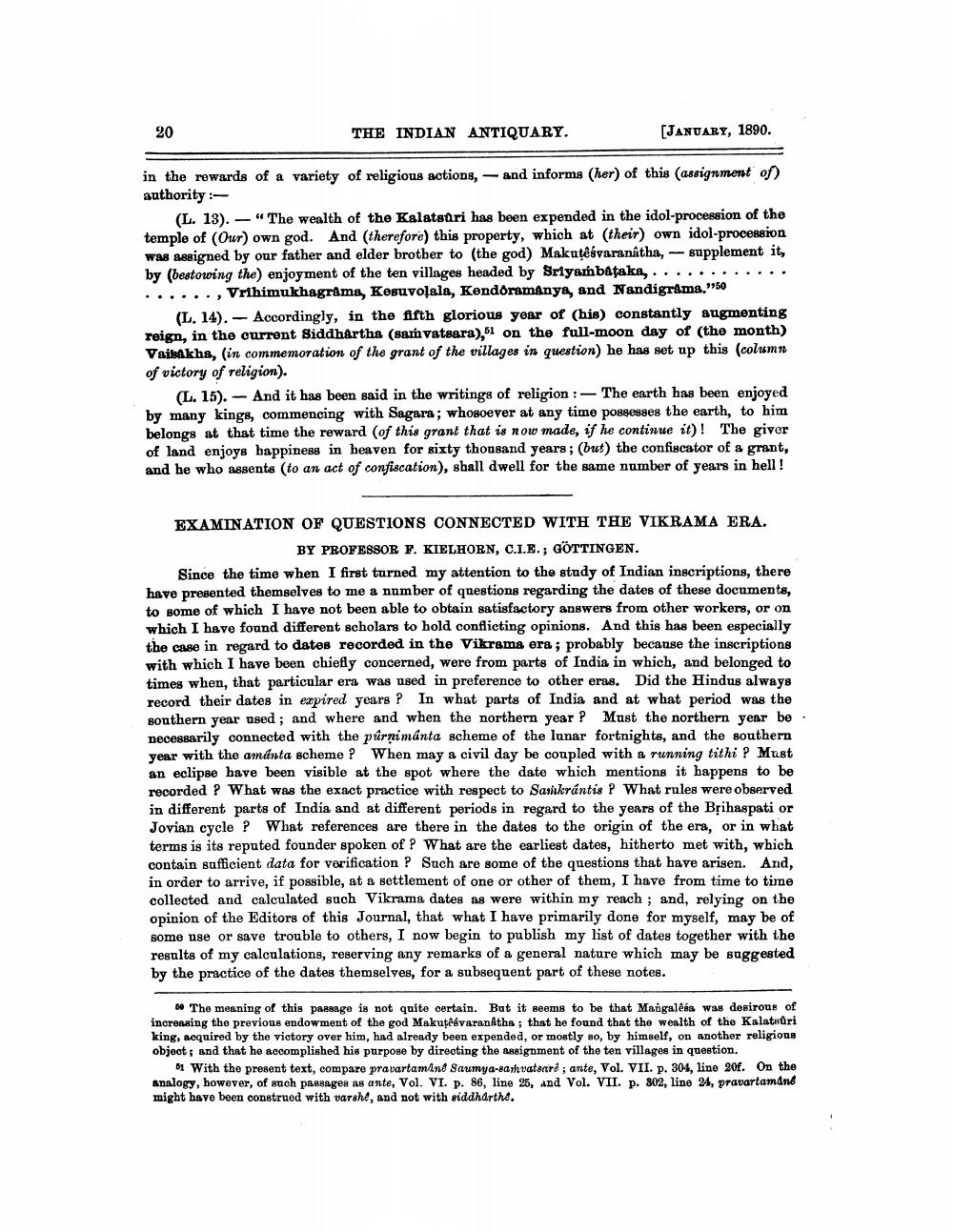________________
20
THE INDIAN ANTIQUARY.
(JANUARY, 1890.
in the rewards of a variety of religious actions, and informs (her) of this (assignment of) authority :
(L. 13). -" The wealth of the Kalatstri has been expended in the idol-procession of the temple of (Our) own god. And therefore) this property, which at (their) own idol-procession was assigned by our father and elder brother to (the god) Makutêávaranátha, - supplement it, by (bestowing the) enjoyment of the ten villages headed by Sriyambataka, ............ ......, Vrihimukhagrama, Kesuvolala, Kendoramanye, and Nandigrama."50
(L. 14). - Accordingly, in the fifth glorious year of (his) constantly augmenting reign, in the current Siddhartha (samvatsara), on the full-moon day of (the month) Vaisakha, (in commemoration of the grant of the villages in question) he has set up this (column of victory of religion).
(L. 15). - And it has been said in the writings of religion :- The earth has been enjoyed by many kings, commencing with Sagara; whosoever at any time possesses the earth, to him belongs at that time the reward (of this grant that is now made, if he continue it)! The giver of land enjoys happiness in heaven for sixty thousand years; (but) the confiscator of a grant, and he who assents (to an act of confiscation), shall dwell for the same number of years in hell!
EXAMINATION OF QUESTIONS CONNECTED WITH THE VIKRAMA ERA.
BY PROFESSOR F. KIELHORN, C.I.E.; GÖTTINGEN. Since the time when I first turned my attention to the study of Indian inscriptions, there have presented themselves to me a number of questions regarding the dates of these documents, to some of which I have not been able to obtain satisfactory answers from other workers, or on which I have found different scholars to hold conflicting opinions. And this has been especially the case in regard to dates recorded in the Vikrama era ; probably because the inscriptions with which I have been chiefly concerned, were from parts of India in which, and belonged to times when, that particular era was used in preference to other eras. Did the Hindus always record their dates in expired years? In what parts of India and at what period was the southern year used ; and where and when the northern year? Must the northern year benecessarily connected with the púrni manta scheme of the lunar fortnights, and the southern year with the amanta scheme? When may a civil day be coupled with a running tithi ? Must an eclipse bave been visible at the spot where the date which mentions it happens to be recorded ? What was the exact practice with respect to Sankrantis P What rules were observed in different parts of India and at different periods in regard to the years of the Brihaspati or Jovian cycle ? What references are there in the dates to the origin of the era, or in what terms is its reputed founder spoken of ? What are the earliest dates, hitherto met with, which contain sufficient data for verification ? Such are some of the questions that have arisen. And, in order to arrive, if possible, at a settlement of one or other of them, I have from time to time collected and calculated such Vikrama dates as were within my reach ; and, relying on the opinion of the Editors of this Journal, that what I have primarily done for myself, may be of some use or save trouble to others, I now begin to publish my list of dates together with the results of my calculations, reserving any remarks of a general nature which may be suggested by the practice of the dates themselves, for a subsequent part of these notes.
60 The meaning of this passage is not quite certain. But it seems to be that Mangalêáa was desirous of increasing the previous endowment of the god Makuțêévaranatha ; that he found that the wealth of the Kalaturi king, acquired by the victory over him, had already been expended, or mostly so, by himself, on another religions objects and that he accomplished his purpose by directing the assignment of the ten villages in question.
01 With the present text, comparo pravartamAnd Saumya-sarhvateard ; ante, Vol. VII. p. 304, line 20f. On the analogy, however, of such passages as ante, Vol. VI. p. 86, line 25, and Vol. VII. p. 802, line 24, pravartamdnd might have been construed with varshe, and not with siddharthe.




